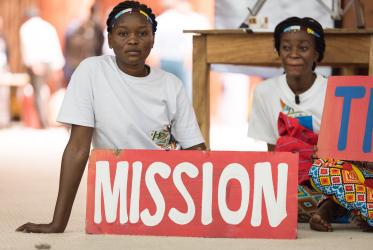Continuation Committee on Ecumenism in the 21st Century
Report on the second meeting of the committee in Belém, Brazil
10-17 January 2009
Click to view pdf version (647 KB)
Content:
- Introduction
- The Context of this Meeting
- Contemporary Challenges
- Theological Framework and Vision
- Institutional Challenges
- Main Foci
- Recommendation
Introduction
1. The ecumenical movement would not exist without the churches’ commitment to the search for visible unity and a common witness to the world. This commitment was and continues to be a task the churches cannot choose or reject. (John 17:21). Churches are called to participate in the reconciling and healing mission of God who “was pleased to reconcile to himself all things, whether on earth or in heaven” through Jesus Christ (Col 1:20/Eph 1:10). The goal for which the churches are striving is first of all a gift of God’s love for creation and all humanity. The fellowship among the churches (koinonia) and the sharing of the gifts they have received reflect the relational reality of the triune God, the Father, the Son and the Holy Spirit.
2. It was not an easy journey from the beginnings of the modern ecumenical movement in the 19th century to the foundation of the World Council of Churches (WCC) in 1948 in Amsterdam. These were challenging times of war and hatred - not at all conducive to the goal the pioneers of the ecumenical movement had in mind. Being responsive to the changing context and creative in their approach, they finally succeeded in bringing the WCC to birth.
3. During the formative years of the WCC, mutual trust and accountability were deeply undermined by war and by colonial attitudes and relationships. Rather than being overwhelmed by the situation, the pioneers of the ecumenical movement were motivated by the strong conviction that they were called to overcome precisely these realities in the search for the visible unity of the church and the struggle for a credible common witness.
4. From that time until the present day, war, hatred, racism and the influence of the unjust distribution of power and wealth within and between different countries and regions threaten to destroy the basis for ecumenical co-operation. Recently, the consequences of the financial crisis and economic recession have further deepened existing inequalities. But this is not the full story. There are also encouraging examples of Christians and churches growing beyond these threats, working together for reconciliation and just relationships through their common engagement. Ecumenical dialogue and co-operation have changed relationships between churches. Together, they have deepened their understanding of being church in today’s world and of the fellowship that has developed between them.
5. With the growth of the ecumenical movement in the 20th century, existing differences have surfaced in new ways. With the increasing institutional differentiation of various actors and functions, new problems emerged. Competition among the various actors has become a factor to be reckoned with. Surely, it is not a simple task to sustain hope in the present situation and to build meaningful relationships as the basis for a shared vision, a common sense of direction and a willingness to address together contemporary threats to humanity and creation [1].
6. The Continuation Committee on Ecumenism in the 21st Century is intended to be an instrument helping churches and ecumenical partners to build on progress made in the analysis of the changing context, to articulate the emerging horizons of the ecumenical vision and the underlying values, and to clarify roles and functions of different actors in the ecumenical movement in order to ensure greater coherence. The committee was formed to implement a recommendation of the 9th General Assembly of the WCC in 2006 in Porto Alegre, Brazil, which responded to two previous consultations in 2003 in Antelias, Lebanon and in 2004 in Chavannes de Bogis, Switzerland with broad participation of representatives from different ecumenical organizations and churches. The committee is and will be offering its reflections and findings to all churches and ecumenical organizations that are represented in its membership. It will present progress reports in 2009 and 2011, and will prepare a final report with recommendations in time for the WCC General Assembly in 2013.
7. The committee accepted the proposal of its moderator, Archbishop Michael Kehinde Stephen, to move forward in the following three steps:
a. Present a shared description of the present state of affairs;
b. Deepen theological reflections on vision and values; and
c. Develop concrete recommendations for action by churches and ecumenical partners.
8. A good start was made with the first meeting of the committee in 2007 in Bossey, Switzerland[2]. The committee reflected on the recommendations that were handed to it by the consultation on Ecumenism in the 21st Century in 2004 in Chavannes-de-Bogis, Switzerland. This second meeting in January 2009 in Belém, Brazil, focused on the first of the three steps outlined by the moderator. The committee addressed emerging trends regarding the changing context, new horizons of the vision and institutional challenges that are spelled out in this document. [3] The meeting was spiritually grounded in prayer from the Orthodox, Roman Catholic and Protestant traditions and in Bible study. The Committee enjoyed the presence of six young theologians who were selected by an essay competition to mark the 60th anniversary of the WCC and benefited greatly from their contributions[4]. At the end of our consultation, the Committee was honoured by the visit of Archbishop Orani João Tempesta, of the Archdiocese of Belém, and we appreciated his reflections and benediction.
Download the complete report as pdf file
[1] Rudolf von Sinner reminded the Continuation Committee in November 2007 in Bossey: There can be no Ecumenical Movement other than the one built on trust, and firstly on trust in God, who in Christ became human and is present through the Holy Spirit. Based on this trust, we can risk trusting each other. This makes us vulnerable. But it is the only way to build meaningful relationships. In many instances, however, it is precisely trust that is lacking, often with outright competition reigning and trust consciously being destroyed. (cf. Continuation Committee on Ecumenism in the 21st Century. Papers for and a report on the first meeting of the committee, Geneva: WCC, 2008, p. 20).
[2] Continuation Committee on Ecumenism in the 21st Century. Papers for and a report on the first meeting of the committee, Geneva: WCC, 2008.
[3] The committee received progress reports on the implementation of the recommendations made in 2007 regarding the mapping of relationships between the variety of ecumenical organizations, their financial stability and efforts for more intentional co-operation especially between the WCC, Regional Ecumencial Organizations and Christian World Communions.
[4] The essays were published in The Ecumenical Review 60/3, Geneva:WCC, 2008.





